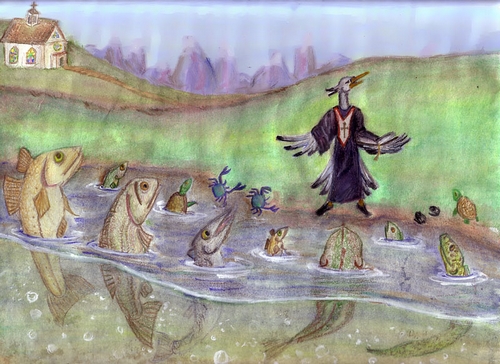
In one of his letters to his sister Justine Mahler, Gustav expresses his opinion by saying that some of the Lieder from the cycle will become symphonies, and effectively, Des Antonius vom Padua Fischpredigt is one of the Lied used in the Resurrection Symphony. Another Lied that is used in this symphony is Urlicht (Essential Light), it shows in the IV movement, and it is also within the cycle of Lieder Des Knaben Wunderhorn.
The text evokes to the famous episode in the life of San Antonio of Padua who, when facing the indifference of his audience, went out to the lake to preach to the fish within, the fish then stuck their heads outside the water and paid great attention to the sermon of the preacher, but once he stops preaching everything continues as before making the words from the sermon trivial.
Therefore, we stand in front of a text that narrates the banality of life, a sarcastic criticism to daily life, where meaningless routine and the world of hypocrisy in which we find ourselves engulfed. Musically speaking, the accompaniment generates the feeling of aquatic flow adopting a ternary rhythm.
The Second Symphony is composed by 5 movements: death, the happy memory of the life that has ceased to shine, the loss of faith, the rebirth of the faith (where the Urlicht Lied is used), and lastly the Love to God.
Mahler uses the music from this Lied in the third movement which represents the negative part of life, at this point he will accentuate the rhythm much more with the kettledrum and staggers fanfares to remark even more the meaningless of life and the complete loss of faith. The composer will also make reference to this Lied when he narrates his sorrows as an orchestra conductor: “I prepare my performances with all my strength (...) and why do I do all of this? For this flock of sheep who tastelessly listen without even thinking; what comes in on one ear, comes out exactly the same through the other ear, just like the fish from San Antonio’s sermon!” (Mahleriana, pàg. 39)
Antonius zur Predigt
Die Kirche findt ledig!
Er geht zu den Flüssen
und predigt den Fischen!
Sie schlagen mit den Schwänzen!
Im Sonnenschein glänzen,
Die Karpfen mit Rogen
Sind all hierher zogen;
Haben d'Mäuler aufrissen,
Sich Zuhörens beflissen.
Kein Predigt niemalen
Den Fischen so g'fallen.
Spitzgoschete Hechte,
Die immerzu fechten,
Sind eilend herschwommen,
Zu hören den Frommen!
Auch jene Phantasten,
Die immerzu fasten;
Die Stockfisch ich meine,
Zur Predigt erscheinen;
Kein Predigt niemalen
Den Stockfisch so g'fallen!
Gut Aale und Hausen,
Die vornehme schmausen,
Die selbst sich bequemen,
Die Predigt vernehmen:
Auch Krebse, Schildkroten,
Sonst langsame Boten,
Steigen eilig vom Grund,
Zu hören diesen Mund:
Kein Predigt niemalen
den Krebsen so g'fallen.
Fisch große, Fisch kleine,
Vornehm und gemeine!
Erheben die Köpfe
Wie verständge Geschöpfe:
Auf Gottes Begehren!
Die Predigt anhören!
Die Predigt geendet,
Ein jeder sich wendet!
Die Hechte bleiben Diebe,
Die Aale viel lieben.
Die Predigt hat g'fallen.
Sie bleiben wie Allen!
Die Krebs gehn zurücke,
Die Stockfisch bleiben dicke,
Die Karpfen viel fressen,
die Predigt vergessen!
Die Predigt hat g'fallen.
Sie bleiben wie Allen!
Die Predigt hat g'fallen, hat g'fallen!
St. Anthony arrives for his Sermon
and finds the church empty.
He goes to the rivers
to preach to the fishes;
They flick their tails,
which glisten in the sunshine.
The carp with roe
have all come here,
their mouths wide open,
listening attentively.
No sermon ever
pleased the carp so.
Sharp-mouthed pike
that are always fighting,
have come here, swimming hurriedly
to hear this pious one;
Also, those fantastic creatures
that are always fasting -
the stockfish, I mean -
they also appeared for the sermon;
No sermon ever
pleased the stockfish so.
Good eels and sturgens,
that banquet so elegantly -
even they took the trouble
to hear the sermon:
Crabs too, and turtles,
usually such slowpokes,
rise quickly from the bottom,
to hear this voice.
No sermon ever
pleased the crabs so.
Big fish, little fish,
noble fish, common fish,
all lift their heads
like sentient creatures:
At God's behest
they listen to the sermon.
The sermon having ended,
each turns himself around;
the pikes remain thieves,
the eels, great lovers.
The sermon has pleased them,
but they remain the same as before.
The crabs still walk backwards,
the stockfish stay rotund,
the carps still stuff themselves,
the sermon is forgotten!
The sermon has pleased them,
but they remain the same as before.
The sermon has pleased them, pleased them!












